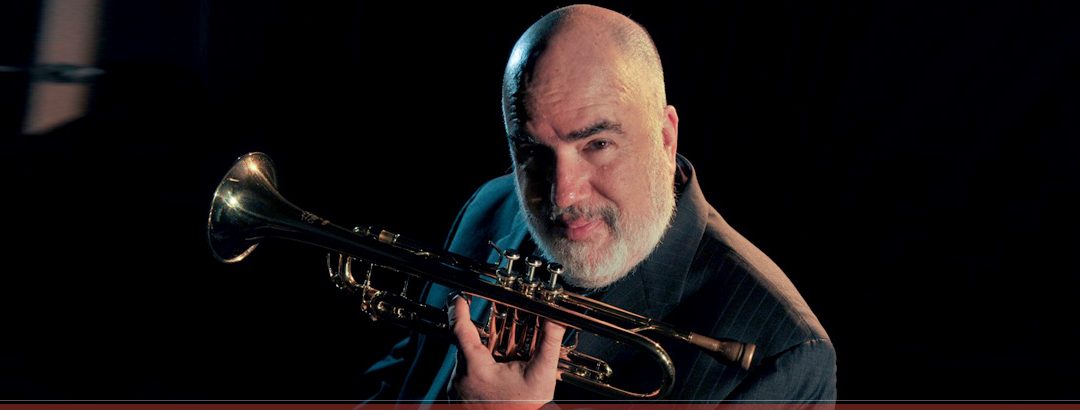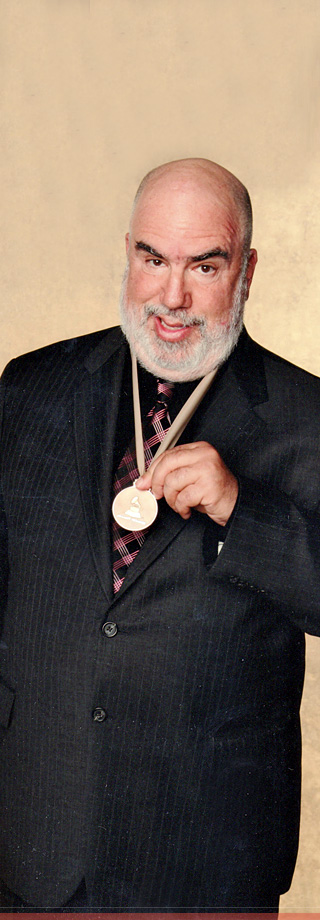
Randy Brecker
Composer, Recording Artist, Performer and Yamaha Clinician
Born in 1945 in Philadelphia to a musical family, jazz trumpeter and composer Randy Brecker has helped shape the sound of jazz, R&B and rock for more than four decades. His trumpet and flugelhorn performances have graced hundreds of albums by a wide range of artists from James Taylor, Bruce Springsteen and Parliament/ Funkadelic to Frank Sinatra, Steely Dan, Jaco Pastorius and Frank Zappa.
Randy’s musical talent was nurtured from an early age. He attended Indiana University from 1963-66 studying with Bill Adam, David Baker and Jerry Coker and later moved to New York where he landed gigs with such prominent bands as Clark Terry’s Big Bad Band, the Duke Pearson Big Band and the Thad Jones Mel Lewis Jazz Orchestra.
In 1967, Randy ventured into jazz-rock with the band Blood, Sweat and Tears, but left to join the Horace Silver Quintet. He recorded his first solo album, ‘Score’, in 1968, featuring a young, then unknown 19 year-old tenor saxophonist named Michael Brecker.
After Horace Silver, Randy joined Art Blakey’s Jazz Messengers before teaming up with brother Michael, Barry Rogers, Billy Cobham, and John Abercrombie to form the seminal fusion group ‘Dreams’. The group recorded two adventurous and wildly acclaimed albums: ‘Dreams’ and ‘Imagine My Surprise’ – now collector’s items – for Columbia Records before they disbanded in 1971.
By 1975, Randy and Michael were ready to front their own group, the Brecker Brothers Band. A band of immeasurable impact and influence, they released six albums on Arista and garnered seven Grammy nominations between 1975 and 1981. Their eponymous first record, which Randy wrote, arranged and produced, featured his now classic composition “Some Skunk Funk.”
As a composer, performer and in-demand Yamaha clinician, Randy Brecker continues to influence and inspire young musicians around the world.
For additional information please visit:
– http://randybrecker.com
Randy Brecker: Predestined For Greatness In Trumpet Playing
How To Become Your Best Improviser According To Randy Brecker
Why did you choose music as your career?
I didn’t choose it… it choose me. My father was a musician, so that’s all we knew around the house, and all three kids played an instrument. Mike started on clarinet, sister Emily on piano (now harp), and me on trumpet at 8.
Did you ever want to give up on playing music?
No, but I had other interests that I also enjoyed…Creative Writing, Communications (at Indiana University).
Where you classically trained then switched to jazz and commercial music?
Yes classically trained by Sigmund Hering of the Philadelphia Orchestra (then Tony Marchione, Bill Adam and Ray Crisara) but I was always listening to, studying, and playing with records at the same time…there was no ‘switch”. Know very few musicians who ‘switch’ just like that. It doesn’t quite work in that fashion…you have to live the life too.
On days when you are not performing or rehearsing how long do you practice for?
I don’t have a specific time period…off and on all day getting the more calisthenic exercises out of the way earlier in the day, then at night after the family turns in, I’ll play with records/play a-longs for a couple hours before I go to bed, practicing in front of a mirror and slowly building up the endurance factor of keeping the horn on my face for the kind of gigs I do… Make it kinda’ like having a gig. So it varies…depends when the next gig/concert is, I take that into account and plan ahead accordingly as far as building up my chops on off days.
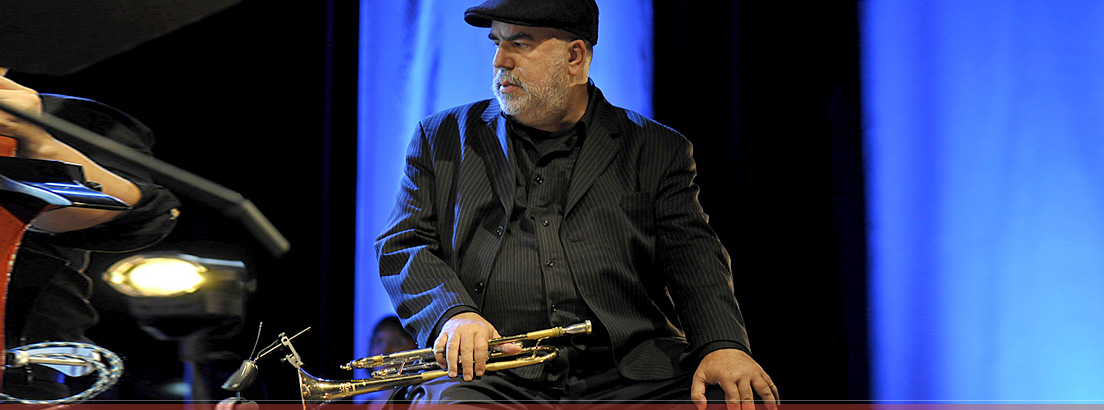
What do you mostly work on when at home practicing?
Endurance, flexibility, sound and working out some new lines to utilize in some fashion by just playing free and writing out new ideas. Also like to play etudes just for the fun of it, to keep my classical training in focus-sometimes I’ll play a transcribed jazz solo in classical style or vice versa…helps everything.
How long where you studying/playing jazz before your solos started sounding cohesive and professional?
Depends on who you ask…as far as I’m concerned: 12 or 13 years old…that was the first time I heard a playback of what I was doing on my Dad’s first tape recorder… and from extensive listening and playing with records I had a head start. I was at a jam session at our house with Dad’s friends and the great Jon Hendricks who had gotten snowed in (in Philly my hometown), came along with one of my Dad’s friends… at one point I sat in-forget the name of the tune I played on, but can still hear it in my head- I sounded pretty darn good…then like 50 years later I went to the Blue Note to hear Jon and Moody together and Jon asked about that tape!! ‘That was history’ he said…asked my sister about it, she has some of my dad’s stuff, but sadly it’s lost….
By the way ‘Lambert Hendricks and Ross’ were also a great path to learning how to play…it was easier to remember the vocalesed solos since there were lyrics and Jon especially swung so hard…I memorized all that stuff singing! When I was 8, third grade in grammar school we had music class once a week and each week it was someone’s duty to bring in a record that he or she liked…it was the days of Elvis and the beginning of Rock n’ Roll but I brought in Jon Hendricks singing ‘Cloudburst’…I was a hip kid.
What kind of scales and patterns do you practice?
Very little of each at this point in time….I practiced scales in high school. Applied them to, and learned the function of, modes in College. Pattern practice is ear training for me, and good for trumpet technique too, so I do a little of that. Don’t use them when I play…or try not to.
When you are improvising are you thinking about scales or are you simply playing melodies and ideas that are playing in your head?
Melodies and ideas, with true spontaneity and compositional prowess, I would hope. Sometimes successful, sometime not! Scales were already internalized long ago, although it’s far from being a ‘simple’ endeavor since what you play is your lifetime of experiences and quite a lot of what you play depends on the communication factor between you and the other musicians.
When soloing, do you have the chord changes memorized or do you simply have an idea of shapes and colors of the tune?
All of the above depending on what style or tune we might be playing. But I don’t really think in ‘shapes or colors’ unless there’s some leftover LSD flowing in my system…it’s more Sound and Space or maybe you could say Textures along with other band members. Colors I try to visualize in Classical Music and large ensembles but still that’s a stretch. Brings me back to a story when I was with Horace Silver at ‘Lenny’s on the Turnpike’ outside Boston, back in 1968. Lenny and I were sitting outside on a stoop outside the club and he was telling me about a conversation he had just had with our saxophonist Bennie Maupin. Bennie loved freer jazz (he was amazing at playing in that style literally from note to note intervallically-he still warms up and plays like that) and used the word ‘colors’ in their conversation. Lenny said to me…”shit if I want ‘colors’ I’ll listen to Beethoven!”
Then there was a solo session also back in the late 60’s with famed singer -songwriter Laura Nyro and she came out of the booth complimenting what I was doing, but wanting my solo to be “more Orange!” I said ‘sure’ but thought to myself ‘uh oh here we go.’ So I visualized a sunset on the beach while I was playing and the next solo I played was cool with her, so maybe there is something to this color thing after all, who knows?
Do you ever run out of ideas when playing a solo?
Not if I’m playing with great musicians. Live.
Are you normally not really concerned with the actual chord changes?
No I’m concerned, and sometimes very concerned…once again depends on the tune. If you are playing ‘Giant Steps’ you’re concerned…if you are playing ‘Bye Bye Blackbird’ you are less concerned and more apt to ‘take it out’ so to speak…once again depending on who you are playing with…When I was playing a lot with Kenny Werner, David Sanchez, Scott Colley and Antonio Sanchez, Kenny would call a standard every once in a while between his originals, like ‘How Deep is the Ocean’ and say ‘open playing’ and we’d collectively work our way into the melody and form for like 15 minutes before we arrived to that point. You can’t do that with everyone though.
Do you write some ideas for the solo before heading to the studio?
No, that wouldn’t occur to me. As far as ‘heading to the studio’…99% of my so called ‘studio work’ these days is done in our own home studio in the basement via file sharing and pro-tools…we’ve done around 60-70 sessions there this year for people all around the world. The last time I did a session at a commercial studio where everyone was there and actually playing together was around a year ago… and before that who knows? Having said this I can also say that my wife saxophonist Ada Rovatti is also a great pro-tools engineer and editor and we get the best trumpet/saxophone sound I’ve ever heard. We’re very good at it. And since you’re asking: that’s reality. And when I record in this fashion everything I play (just about) is manipulated or composited so the end result is perfect. That’s just the way it is and really has to be, since everything on most tracks are manipulated to perfection.
Do I like this way of recording? Obviously not… but that’s what’s happening in 2017 and most records are done like this since no one has budgets…it’s a crowd-funding world too. In fact there are no large studios in Manhattan. One by one they closed. The last one: Avatar (formerly the Power Station) was just sold to Berklee School of Music so they ‘can have a presence in NYC. If they will hire it out commercially is still not clear. So at least young student’s parents can spend a small fortune so their son or daughter can learn how to be recording engineers…now if only there were some studios left to hire them! LA is probably a somewhat different story since they still do a lot of film and TV dates out there.
Do you prefer to play with your own band or with other groups?
Both to keep things musically interesting. The more the merrier, as long as the quality of the music is of a high level.
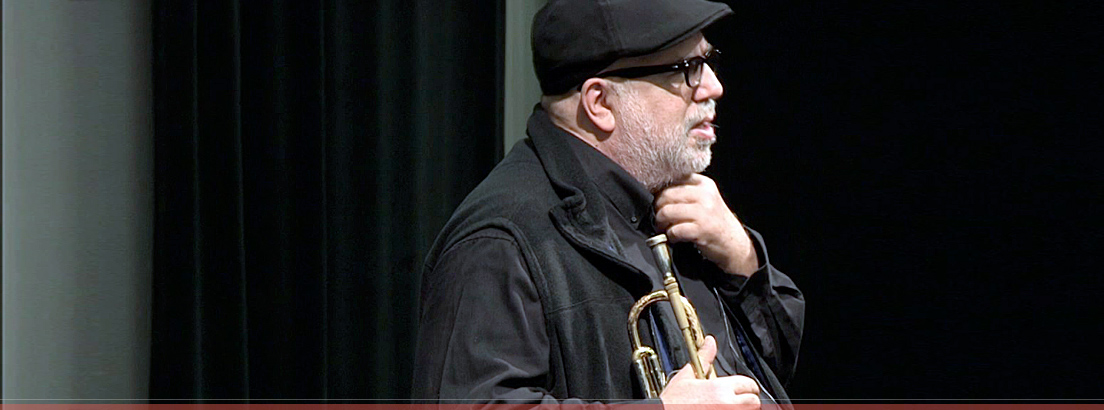
Do you approach your playing any different if you are playing with your big band as opposed to as a soloist in somebody else’s group?
No…some nuances may be different depending on the style of the band, and who is playing, but my vocabulary and wealth (or lack) of ideas all come from the same brain. Might add some guitar effects on more electric gigs to blend better. Whatever it is I just go for it.
Who do you listen to for inspiration?
Too many to list here from all styles of music, all instruments, and countries the world over… I still listen for hours each day: YouTube, iTunes, etc I’m not a big fan of social media, it has basically destroyed our business, but the one thing about all the technology that can’t be beat, is seeing and hearing the History of Jazz and all Music, filling in the blanks, learning some things new every day and trying to stay somewhat current and up to date at the same time, even though that’s impossible-things move too fast now.
As far as other forms of Inspiration: The Dalai Lama is good for that. I read his books and also autobiographies of my heroes – their thought processes. And I like to collect and look at photos of great musicians on my laptop…all of these endeavors help get me into the practice room. I have close to 3600 pics of musicians in a file in iPhoto. (including many of me and Mike)
Do you enjoy teaching or do you prefer to be out recording and playing instead?
I just like to play. I do good clinics and workshops too which I enjoy. Trumpet teaching one on one is not usually in my schedule…am away too much and I really never developed a teaching ‘system’ or philosophy, so I feel I’d short-change a student…there surely are a lot of great teachers out there (I know that too from YouTube) so I know how it’s done, but it’s not something I do in my comfort zone.
When recording, do you go for the first solo or do you do a few takes of the solo until you are happy with the result?
First is best but now with pro-tools it’s a different story. It’s a file-sharing world…. usually the bulk of the solo is the first take or second at the most then its downhill from there. But now a lot gets manipulated to make it perfect (see more about this below). Back in the day…yes first takes were the shit. Miles liked to use the first-look run-downs of the tunes in the studio (during the Wayne, Herbie, Ron,Tony days), as the ’takes’…he thought that was when the best most spontaneous stuff happened, much to the chagrin of everyone else. He never really ever rehearsed the band. He said (in that raspy voice): ‘You can’t rehearse the future!!
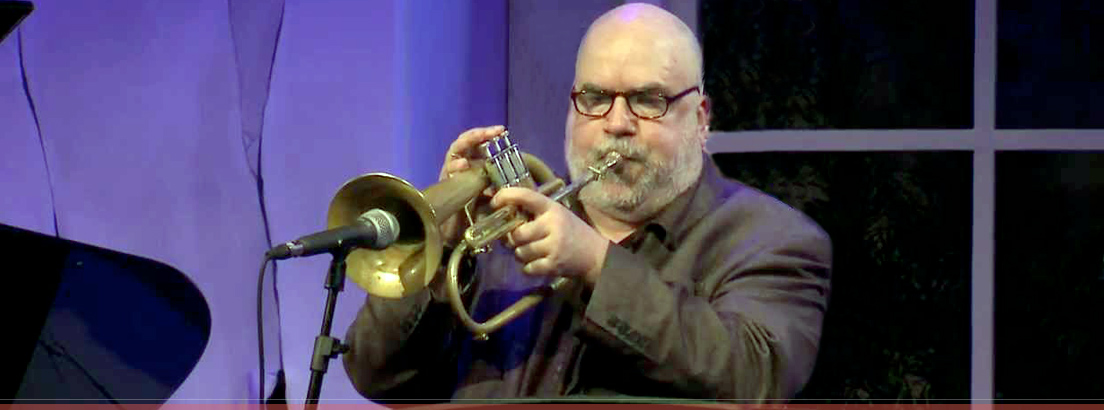
What equipment are you currently playing?
Bach Megatone 2 ½ C. Yamaha Xeno 8335 trumpet… 8315 Yamaha Flugelhorn. And a 4 valve Schilke Piccolo.
Do you select different equipment depending on the group or what the job calls for?
No, not at this stage…people call me knowing what I can do and what I can’t.
How much time and effort do you put into composing?
These days very little…it doesn’t pay anymore. And it’s not a fun endeavor to sit alone in a room and ruminate over each phrase. If I really need a new tune for something, I’ll get it done though. In the old days when we were selling hundreds of thousands of records, I was a lot more motivated to write since we got big fat publishing checks, and more importantly by far, was the fact that people HEARD what we were doing and they were actually buying the records.
When composing do you work out a progression then a melody or does the melody come first?
Any of the above, or a rhythmic idea etc…. or sometimes (albeit rarely): all at the same time if I’m sitting at a keyboard or my piano. Always use as an example the intro to “Some Skunk Funk”, where each phrase was thought of on a different instrument (trumpet, piano, fender rhodes, or clavinet) and then mashed together.
Clinic on Jazz Trumpet Phrasing And Articulation
Do you have a formula you follow when working on new compositions?
No the only formula I work with is to have no formula. I never studied composition… I do develop simple ideas then continually re-work and broaden them and eventually the music and arrangement kind of reveal themselves. Usually a long process…
Do you do the arrangements for your own compositions or do you delegate that to someone else?
Usually I do them, unless the project calls for someone else to do it…I don’t do big band arrangements, but am good at smaller horn section arrangements and did a lot of that writing for people like Chaka, George Benson and Diana Ross way back when.
Of all your compositions, is there one that is your all-time favorite?
Well according to YouTube number of ‘hits’ and ‘versions’ that would be Some Skunk Funk something like 54,000 hits….
I personally don’t have a favorite. But it’s fun watching Serbian Tap Dancers dance to ‘Skunk’ or marching bands playing it, or string quartets and trios and there was an ice skating routine to it on the Donnie and Marie Osmand TV show when it first came out. Now, that tune has kind of become a ‘rite of passage’ for young musicians.
How much time and effort did it take you to complete your latest album?
It’s always time consuming and a big effort… I don’t count the hours. The latest is a project with one of the wonderful ‘radio-bands’ in Germany the NDR Big Band from Hamburg… Arranger Jorg Achim Keller chose 11 tunes of mine from different periods and wrote some great arrangements for the Big Band with an extended Woodwind Section…It’s being mixed now… (more work!) long distance trading files back and forth since I can’t be there… then mastering… Dave Sanborn, Ada Rovatti and the great German drummer Wolfgang Haffner are guests.
Now that you are an established soloist, what is your biggest career challenge?
“Stayin’ Alive, Stayin’ Alive” and improving my playing. Simple as that.
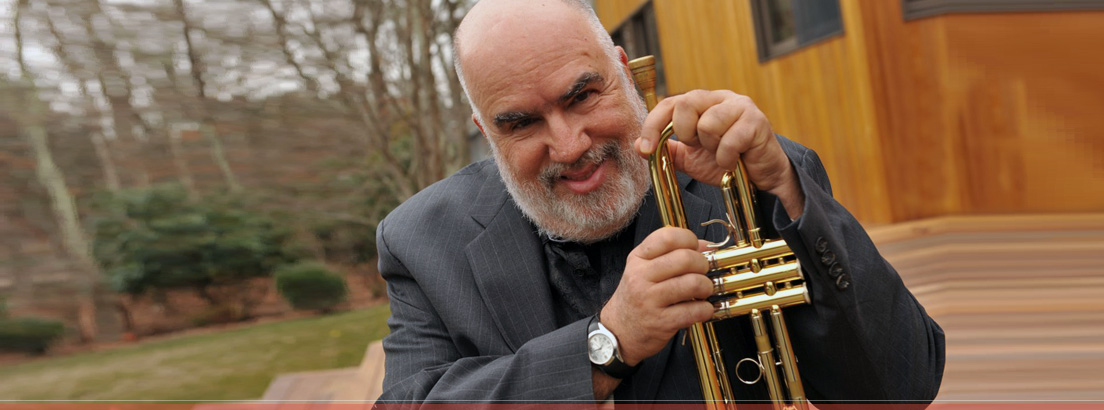
Serious music students use your solos as part of their learning tools, how do you feel about that?
Am flattered, but hope that’s not too much part of their learning experience…
I always tried to focus on many players and different instruments other than just trumpet so I wouldn’t sound like one person or another too much.
Did you ever imagine your solos would have such an impact on others?
Didn’t really think about it….
There’s a cumulative effect I think from years of putting out records…I Never imagined any of this really. Was in the right place at the right time. It still feels like I’m just starting out.
Best advice you would give to an upcoming player?
LISTEN! (Closely to the details/nuances)…and well, PRACTICE! Keep a fallback position in your back pocket. Don’t kid yourself about the state of the biz these days.
Best tip for anyone learning the art of improvisation?
Listen, learn by imitating at first, isolate your stylistic strong and weak points, then broaden your vocabulary, technique and sound, try writing tunes and put a band together to get a sense of who you are, and then forget about everything you’ve learned when you start to play
….and oh yeah make sure along the way you learn how to swing, that’s a whole other discussion, and really can’t be put into words. OK I’m done.
Randy Brecker’s Solo on Some Skunk Funk
Notable Albums As A Leader

